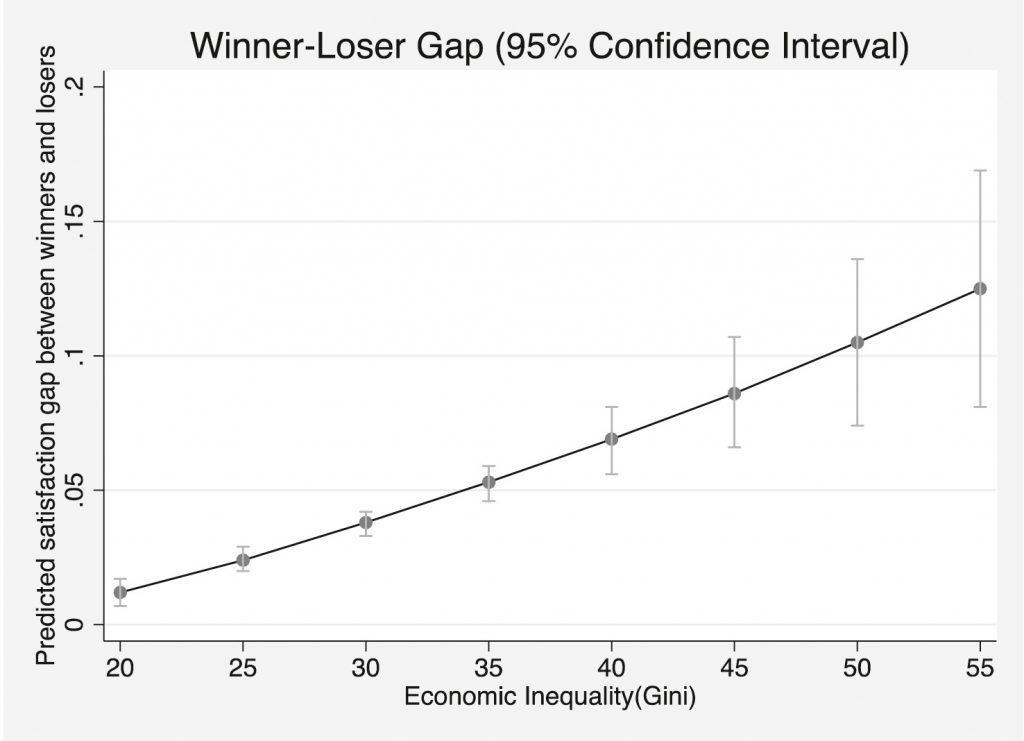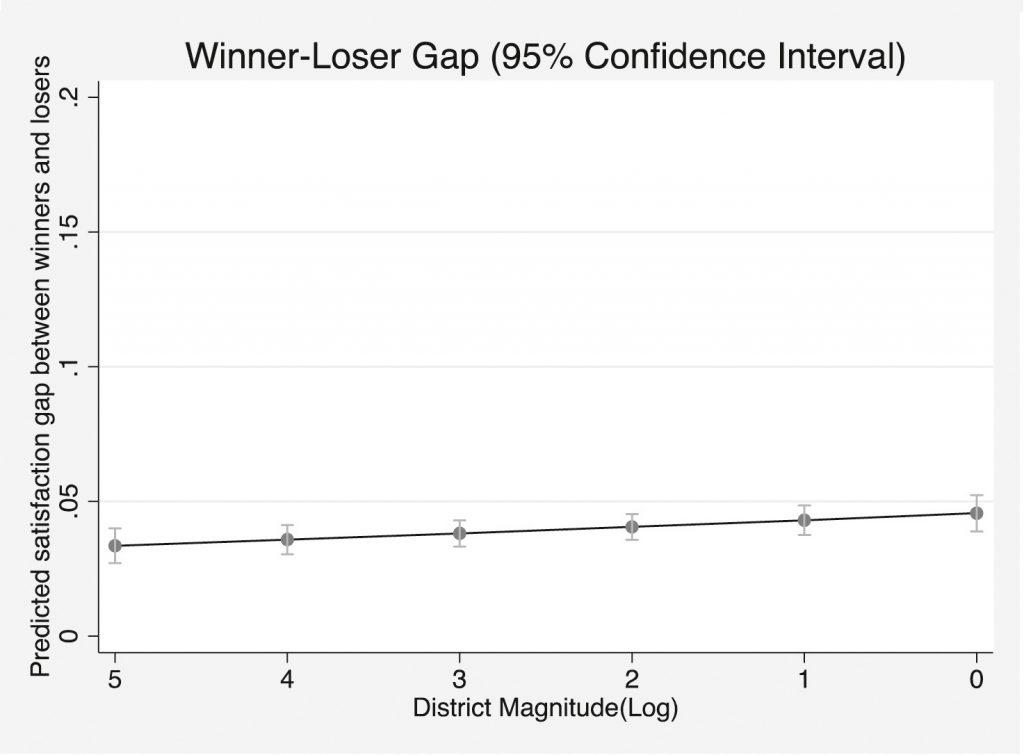Economic Inequality Drives Electoral Winners and
Losers’ Satisfaction with Democracy
Sung Min Han and Eric C.C. Chang
Few would dispute that citizens’ support for democracy is crucial for democratic stability and consolidation, especially when populism and extremism threaten to undermine democratic ideals and values in these days. Without citizens’ strong endorsement, democracies can face legitimacy crises and may even experience democratic reversal or breakdown.
What factors can influence citizens’ attitudes toward democracy, then? Anderson and his co-authors have significantly advanced our understanding of citizens’ attitudes when they identified electoral winner-loser status to be one of most important determinants for democratic satisfaction (Anderson & Guillory, 1997; Anderson et al., 2005). How to relieve the losers’ agony regarding democracy has consequently become a major concern. According to Anderson and his co-authors, proper design of electoral systems is the key to earning the consent of electoral losers. Specifically, they suggest that proportional representation systems comfort electoral losers because they offer future coalition governments to the losing parties, allowing them to influence policy outcomes. However, Anderson et. al’ s findings have been under heavy scrutiny lately, as several recent studies have failed to find corroborating evidence for the mediating effect of electoral systems (Blais & Gélineau, 2007; Curini et al., 2012; Howell & Justwan, 2013; Singh, 2014).
In our recent work published in Electoral Studies, Economic Inequality, Winner-Loser Gap, and Satisfaction with Democracy, we argue that much of the debate over the mediating effects of electoral systems stems from overlooking the role of income inequality. We suggest that a state’s level of income inequality is the real driver behind electoral winners and losers’ satisfaction with democracy. Specifically, the socio-economically disadvantaged classes are more likely to intensify their demand for redistribution when income inequality is high. This heightened redistributive pressure induces the wealthy to be more aware of potential wealth transfer after losing an election. Under these circumstances, when either economic group (i.e., the poor or the rich) loses the election, that group’s dissatisfaction with democratic practices will be even more pronounced. The electoral winners, on the other hand, are more content with democratic practices due to their expectation of future distributive outcomes. When income parity is low, however, “the have-nots” may not express much dissatisfaction with democracy even if their parties lose, while “the haves” may be less concerned about future redistribution from electoral loss. In short, under economic parity, the winner-loser gap in satisfaction with democracy should be small. Taken together, the gap in satisfaction with democracy between electoral winners and losers widens as income inequality increases.
Employing a multilevel analysis using data from Modules 2 and 3 of the Comparative Studies in Electoral Systems (CSES) across 76 elections in 43 countries, our study finds the satisfaction gap between electoral winners and losers widens as economic inequality grows. Figure 1 illustrates the predicted democratic satisfaction gap between electoral winners and losers at the different levels of economic inequality. Clearly, when inequality is low, the satisfaction gap between electoral winners and losers is not distinctive. However, as economic inequality increases, the gap in democratic satisfaction widens. This is substantially meaningful given that the change from low inequality (Gini coefficient equals 25) to high inequality (Gini coefficient equals 50) generates about an 8 percentage point increase in the predicted satisfaction gap between winners and losers.
Figure 1. Predicted Winner-Loser Gap by the Level of Inequality
Our study also finds that the mediating effect of ethnic inequality is greater than the mediating effect of electoral institutions. Figure 2, depicting the predicted probability of democratic satisfaction by electoral system, suggests that the change from most proportional electoral system (district magnitude equals to 150) to least proportional system (single member district system) generates only about a 1.5 percentage point difference in satisfaction gap between electoral winners and losers.
Figure 2. Predicted Winner-Loser Gap by Electoral Systems
These results have important implications. First, the larger impact of income inequality implies that previous findings regarding the mediating effects of electoral systems might be arbitrary. More importantly, our study suggests that under equal economic distributions, electoral winner-loser status is not be crucial in explaining democratic support. Rather, handling distributional conflict could be key to securing democratic consent from electoral losers.
Sung Min Han is an assistant professor in the School of Public Economics and Administration at Shanghai University of Finance and Economics. His research interests includes politics of inequality, redistribution, Asian politics, and political methodology.
Eric C.C. Chang is Associate Professor in the Department of Political Science at Michigan State University. He studies comparative political economy, political institutions, political corruption, and democratization in both developed and developing democracies.
References
Anderson, C.J., & Guillory, C. (1997). Political institutions and satisfaction with democracy: a cross-national analysis of consensus and majoritarian systems. American Political Science Review, 91, 66-81.
Anderson, C.J., Blais, A., Bowler, S., Todd, D., & Listhaug, O. (2005). Losers’ Consent: Elections and Democratic Legitimacy. Oxford University Press: New York.
Blais, A., Gélineau, F. (2007). Winning, losing and satisfaction with democracy. (2007). Political Studies, 55, 425-441.
Curini, L., Jou, W., & Memoli, V. (2012). Satisfaction with democracy and the winner–loser debate: the role of policy preferences and past experience. British Journal of Political Science, 42, 241-261.
Howell, P., & Justwan, F. (2013). Nail-biters and no-contests: the effect of electoral margins on satisfaction with democracy in winners and losers. Electoral Studies, 32, pp. 334-343.
Singh, S. (2014). Not all election winners are equal: satisfaction with democracy and the nature of the vote. European Journal of Political Research, 53, 308-327.
